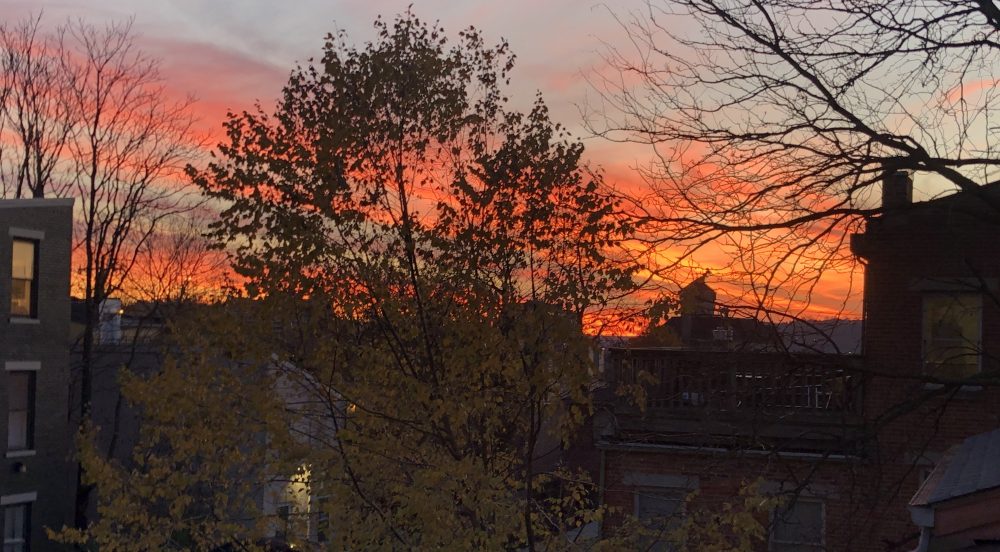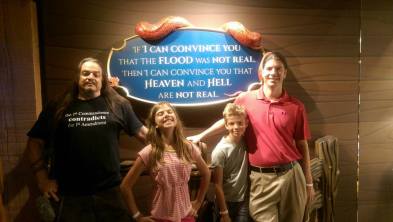
Hassan Shibly
We all know this recent Muslim travel ban was just a shot over the bow. Trump promised much worse during the campaign, and apparently he intends to deliver. There has even been talk that we might soon have something resembling a Muslim registry. Some say, if it comes to that, they will register as Muslims. Though I am sympathetic with this impulse, I will not be able to sign that with integrity. I am not Muslim. So, where can I sign now, to let my government know where I stand on religious freedom?
To find out, I visited the local mosque to attend a CAIR (Counsil on American-Islamic Relations) sponsored event: “Unapologetically Muslim and American”. It featured Hassan Shibly, Chief Executive Director of CAIR Florida, along with Karen Dabdoub, Executive Director of the Cincinnati Chapter.
The message of the presentation was clear. Islamophobia is rampant throughout the country. Incidents range from bullying in school through discrimination in the workplace or in housing all the way to hate crimes. The presenters advised Muslims to stand up for their rights, to refuse to hide or simply hope that the situation would resolve itself, and to involve CAIR as soon as possible before things escalate. CAIR is there to help.
They also noted the support Muslims have received from the majority community in America. They described incidents of Muslims praying in airports, for example, protected by Jews and Christians standing silently by to prevent any disruption of their prayers. They mentioned Madeline Albright, who says she is ready to sign up if that Muslim registry comes to exist. They also reminded us of the history of immigrant groups coming to America, groups which faced bigotry but eventually gained acceptance, at least from most Americans.
Shibly focused on relations with the government, especially US Customs and the FBI (“definitely not the Friendly Brotherhood of Islam”).
They spent quite a bit of time talking about what to expect on returning to this country from abroad. Everyone is asked where they went and why they traveled. Some will be pulled aside for secondary screening. Whereas this occurs for a typical American citizen about 1% percent of the time, Muslims were being pulled aside for this extra scrutiny about half the time, according to Shibly. Shibly’s advice was simple: as soon as they ask anything about your personal political or religious views, assert your rights. As an American citizen, you have the right to ask for a lawyer to present during the questioning. If you are a non-citizen, with a green card for example, the prerogatives of the officials are less constrained, but you still have the right to call a lawyer. Despite what the officials might say, you are likely to be detained just as long whether you call a lawyer or not, and without the protection of someone familiar with the intricacies of the law and normal procedures, you will be vulnerable. Karen Dabdoub urged people to text the CAIR office when arriving, before getting off the plane, so that if CAIR does not hear from you within an hour or so, they can know to intervene with Customs to find out what has happened to you. Thus, a Muslim entering the country can expect to be inconvenienced, but, with proper precautions and the help of CAIR, these inconveniences need not grow into anything more severe. Nonetheless, foreign students are strongly encouraged to stay inside the country until their education is finished.
Shibly then went on to discuss the FBI, which he described as a government agency that is targeting Muslims, through entrapment and through intimidating people into becoming informants.

Karen Dabdoub
Karen Dabdoub followed up with a hypothetical example of an person who thinks they have nothing to hide talking with the FBI. The agent might ask a question, and then much later in conversation, ask the same question differently. If there were inconsistencies in your answers, then they could charge you with lying to the FBI, a crime that can be punished with up to five years of jail time. (Of course, it is perfectly legal for them to lie to you.) Now, they have something to hold over you, to intimidate you into becoming an informant.
Their advice was the same: ask for a lawyer to be present during questioning. Whatever the motives of the people in power, the American government is constrained by the Constitution. Muslims, like all Americans, need to assert their rights under this Constitution in order to maintain them. If the government tries to intrude into your personal life in any way, don’t try to handle it yourself; call CAIR. CAIR has a lawyer who will contact the FBI on your behalf. Shibly recalled one incident where he felt the FBI had a legitimate reason to question his client, but in the others, he told the agent that he would advise his client to not answer any of his questions. Usually, the FBI would then leave the person alone after that.
All this sounded pretty paranoid to me. After, the event, I did a little research to find out whether the paranoia was justified. Interestingly, I found a 2005 article where a freshman at the University of Buffalo named Hassan Shibly was detained at the border, apparently for no reason other than he was Muslim. I suspect that experience had a role in shaping his career.
In a more comprehensive view, Human Rights Watch clearly supports their complaints:
In a lengthy examination of U.S. terrorism prosecutions, Human Rights Watch, working with Columbia Law School’s Human Rights Institute, said the FBI and the Justice Department have created a climate of fear in some Muslim communities through the use of surveillance and informants.
 I found several accounts of the “Newburgh Four”, a group caught up in an FBI sting operation that Shibly had mentioned. It appears sordid. Yes, these guys, all black, all Muslim, all poor, did get caught up in a terrorist plot, but the plot was entirely concocted by the paid FBI informant. Even the judge who sentenced the defendants was upset by the FBI’s conduct.
I found several accounts of the “Newburgh Four”, a group caught up in an FBI sting operation that Shibly had mentioned. It appears sordid. Yes, these guys, all black, all Muslim, all poor, did get caught up in a terrorist plot, but the plot was entirely concocted by the paid FBI informant. Even the judge who sentenced the defendants was upset by the FBI’s conduct.
Only the government could have made a terrorist out of Mr Cromitie, a man whose buffoonery is positively Shakespearean in its scope… I believe beyond a shadow of a doubt that there would have been no crime here except the government instigated it, planned it and brought it to fruition.
Unfortunately, one of the men caught up in the scheme was mentally ill, possibly schizophrenic. Shibly reported visiting him in jail, apparently out of his mind, on suicide watch in solitary confinement, cold, sad and hopeless.
It is hard to see how we are made any safer by such operations.
It doesn’t have to be like this. For example, in Dearborn, Michigan, which has a sizable Muslim population, the local chief of police runs an outreach and informant program that is considered a model by authorities on counterterrorism. Informally, it appears to employ the same principles of “community policing” that have proven successful in Cincinnati. You engage the community, treat people fairly, and they help you succeed because they want to live in safety. It works. The police chief in Dearborn can cite examples where Muslims have turned in fellow Muslims.
The FBI might pay lip service to building this kind of trust with the Muslim community, and in fact some within the bureau appear to be making a sincere attempt to do that. However, based on what I have learned, from Human Rights Watch, from CAIR, and from reliable news sources, that ship has sailed, and the Trump administration is unlikely to ask it to change course.
Following the presentation by Shibly and Dabdoub, there was a question and answer session. I got to ask my question. I referenced Madeline Albright’s willingness to sign up if there is ever a Muslim registry. “But I will not be able to sign that with integrity. So where can I sign up now to let my government know where I stand?”
My question got a round of spontaneous applause. The answer was a little vague. Go to the alerts on the CAIR website and write your Senators and Congressman about the issues that concern us all.
It looks like we will have lots of opportunities to do that.
Trump has expressed surprise that there was so much furor over his executive order. After all, “We had 109 people out of hundreds of thousands of travelers and all we did was vet those people very, very carefully.” Of course, he seems to enjoy the drama of it all.
We should not expect Trump’s assault on the Constitution to begin with a massive charge, but with a limited action such as this one. Regardless of the number affected, we need to guard against anything that “target[s] individuals for discriminatory treatment based on their country of origin and/or religion, without lawful justification.” (item 64, page 13) . If we want to preserve our freedoms, we must preserve them for everybody.



 I spoke with one young man who asked me what I thought was important in the Bible. I pointed to the teachings of Jesus, particularly “Love thy neighbor as thyself”. He asked “What does that mean”, and someone else responded with something like “jerk off your neighbor.” The young man questioned further, “ ‘Honor thy father and mother’ what does that mean, really?” I was surprised by the question, and without a quick answer. I was taking his question seriously, contemplating in good Quaker fashion how to respond, but, unaccustomed to such pauses, he wandered away.
I spoke with one young man who asked me what I thought was important in the Bible. I pointed to the teachings of Jesus, particularly “Love thy neighbor as thyself”. He asked “What does that mean”, and someone else responded with something like “jerk off your neighbor.” The young man questioned further, “ ‘Honor thy father and mother’ what does that mean, really?” I was surprised by the question, and without a quick answer. I was taking his question seriously, contemplating in good Quaker fashion how to respond, but, unaccustomed to such pauses, he wandered away.
 Free Thinkers:
Free Thinkers:
 The essay below is written by Freda Shamma, a member of the
The essay below is written by Freda Shamma, a member of the 











